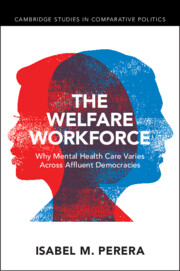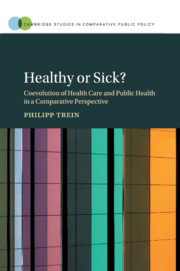The Welfare Workforce
The Welfare Workforce is a thought-provoking exploration of mental health care in the United States and beyond. Although all the affluent democracies pursued deinstitutionalization, some failed to provide adequate services, while others overcame challenges of stigma and limited resources and successfully expanded care. Isabel M. Perera examines the role of the “welfare workforce” in providing social services to those who cannot demand them. Drawing on extensive research in four countries – the United States, France, Norway, and Sweden – Perera sheds light on post-industrial politics and the critical part played by those who work for the welfare state. A must-read for anyone interested in mental health care, social services, and the politics of welfare, The Welfare Workforce challenges conventional wisdom and offers new insights into the complex factors that contribute to the success or failure of mental health care systems. This title is also available as Open Access on Cambridge Core.
- Theorizes the role of public employees in shaping policy outcomes for mental health care
- Draws on extensive primary source historical evidence from four countries: the United States, France, Norway, and Sweden
- Available as Open Access on Cambridge Core
Reviews & endorsements
'So many intriguing puzzles here. Why do governments provide services to those who cannot request them, such as the severely mentally ill? Why do countries with similar health systems or welfare states diverge when it comes to mental health policy? Perera's fascinating, one-of-a-kind analysis focusing on welfare state workers and public managers is a seminal contribution not just to the study of mental health but also to the comparative study of social policy.' Andrea Louise Campbell, Arthur and Ruth Sloan Professor of Political Science, Massachusetts Institute of Technology
'An incredibly important and original book. Perera persuasively shows that understanding the contemporary welfare state requires understanding the organization of its workforce in theorizing how different worker–management relationships shape the politics of welfare. The result is a beautifully written and insightful take on the evolution of mental healthcare in advanced democracies, and one that opens a new lens on one of the most central, and largely unexamined, parts of the modern state.' Jane Gingrich, Professor of Social Policy, University of Oxford
'Masterfully marshaling comparative evidence and reasoning, Perera proves that because the mentally ill are a politically silent minority, and because more populous and economically powerful interest groups have little at stake, the agents, causal pathways, and outcomes in mental health policy deviate strikingly from patterns of change across countries in more extensively researched welfare state arenas.' Peter Swenson, Charlotte Marion Saden Professor of Political Science, Yale University
Product details
January 2025Paperback
9781009499842
288 pages
229 × 152 × 15 mm
0.42kg
Not yet published - available from February 2025
Table of Contents
- 1. The welfare workforce: managers and workers make strange bedfellows
- 2. Nowhere to go? The supply of mental health services across countries
- 3. Before deinstitutionalization: the United States and France compared
- 4. Deinstitutionalization in the United States
- 5. Deinstitutionalization in France
- 6. Deinstitutionalization elsewhere: a Scandinavian check
- 7. Beyond deinstitutionalization: welfare workers and welfare capitalism
- Postscript: the evolving definition of the 'welfare workforce'
- Appendix. Comparative deinstitutionalization data set: codebook and source information.










